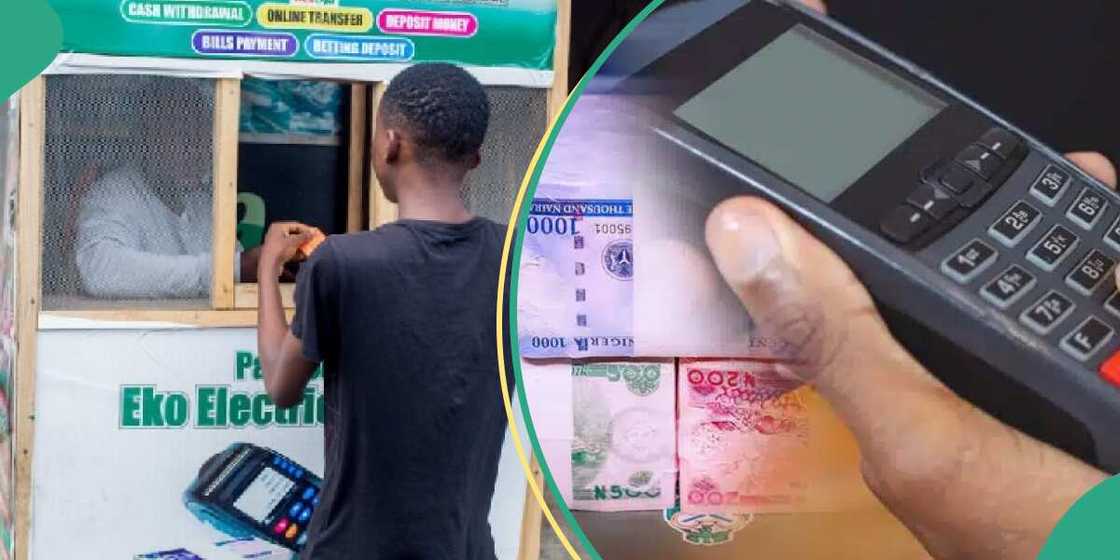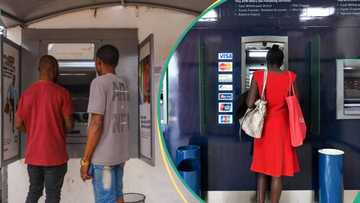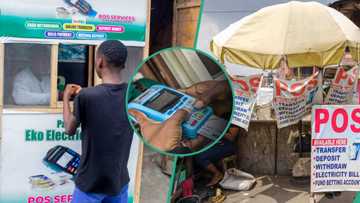PoS Scams on the Rise as Nigerians Lose Millions to Fraudulent Money Transfers
- There is a growing sense of unease among Nigerians when it comes to transacting business via PoS machines
- Certain dishonest PoS operators are exploiting these devices to defraud unsuspecting customers.
- Many are concerned that the downsides may erode people's trust in digital financial transactions
PAY ATTENTION: The 2024 Business Leaders Awards Present Entrepreneurs that Change Nigeria for the Better. Check out their Stories!
Legit.ng journalist Victor Enengedi has over a decade's experience covering Energy, MSMEs, Technology and the stock market.
Although Point of Sale (PoS) machines have brought significant convenience to financial transactions in Nigeria, numerous individuals in the country have fallen prey to fraudulent activities.
The unscrupulous actions of scammers are dissuading many Nigerians from embracing this technology for their business transactions.
This development follows Legit.ng's earlier report that Nigerian banks lost a massive N9.5 billion to electronic fraud from January to August 2023.

Source: UGC
PAY ATTENTION: Click “See First” under the “Following” tab to see Legit.ng News on your Facebook News Feed!
Many Nigerians favoured it primarily because it allows consumers to withdraw money with minimal commissions, especially when the closest Automated Teller Machines (ATMs) or banks are inconveniently distant.
PoS transactions spared bank customers from enduring extended queues and the intermittent network issues frequently encountered at ATM locations.
This convenience motivated numerous Nigerians to adopt PoS as an alternative method for depositing or receiving money in any bank account nationwide.
Moses Akinwale, a trader in Mile 2, told Legit.ng:
"The PoS machine has been very helpful to my business. It's good for ease of payment for those that don't carry cash but debit cards. It was the saving grace for us traders when the naira scarcity crisis happened."
They also facilitate various banking transactions, such as paying utility bills for electricity and water and purchasing airtime and data, among other services.

Read also
Nigerian payment company loses N11 billion to security breach, funds transferred to many accounts
PoS fraudsters on the prowl
Despite the policy's positive impact on the populace and the economy, there is a growing sense of unease among Nigerians when it comes to conducting business transactions through PoS machines.
Unscrupulous PoS operators have now resorted to using these machines to defraud unsuspecting customers, resulting in many more falling victim to such fraudulent activities.
A new facet of the fraud associated with PoS machines involves incorporating mobility into illicit business practices.
Instead of operating from stationary kiosks, some fraudulent PoS operators have adopted an itinerant approach, moving from one location to another in open markets, motor parks, and other areas with large crowds, actively advertising their services.
Sumbo Ajimobi, a civil servant who was once a victim, told Legit.ng how she was defrauded by a mobile PoS operator.
"One day, I made a withdrawal of about N10,000, only to later find out that close to half of the currency I was given was fake. The operator was mobile and there was no way I could return there and find him."
PoS operators are victims, too
Point of Sale (PoS) operators are not immune to fraudulent activities and fall victim to deceptive customers.
Similar to how customers are scammed, PoS operators are also encountering scams from their customers.
One PoS operator shared an incident where they received a transfer from a customer, only to realize later that it was a fraudulent transaction after having already disbursed funds to the customer.
The negative accounts of such experiences with PoS customers have led to a sense of caution among some Nigerians, making them hesitant to patronize PoS agents.
Beyond physical scams, there is also a risk posed by hackers who exploit weak and unsecured networks.
These cybercriminals find it relatively easy to infiltrate systems and steal valuable customer information, including credit card numbers, National Identification Numbers (NIN), Bank Verification Numbers, and other sensitive business details.
PoS, gift and curse
In the face of elevated unemployment rates, limited financial inclusion, and the challenges linked to conventional banking services, the Point of Sale (PoS) model is undeniably accomplishing its goals.
It effectively generates employment opportunities for the youth, facilitates access to petty cash for small-scale business transactions, and contributes to alleviating congestion in traditional banking halls.
Numerous individuals have expressed concerns that if the current trajectory persists without intervention, it may erode people's trust in digital financial transactions.
This is particularly true for those who primarily view the PoS system as an alternative to the traditional banking system.
It has also been observed that such criminal activities can lead people to abandon the nation's cashless policy; hence, the government needs to establish a robust security network to combat this menace effectively.
Nigerian banks witness 12,553 mobile, PoS, and ATM fraud incidents in 3 months
In related news, Legit.ng reported that 12,553 cases of mobile, PoS, and ATM fraud Incidents were reported in Nigeria's banking sector in the first three months (Q1) of 2023.
This figure marks a 14.07% decrease from 14,609 cases recorded in the last quarter (Q4) of 2022.
This was disclosed in a report titled, "Reports on Frauds and Forgeries in Nigerian Banks", recently published by the Financial Institute Training Centre (FITC).
The data indicates that mobile fraud, computer/web fraud, and POS-related fraud ranked as the most prevalent forms of fraudulent activities.
PAY ATTENTION: Stay Informed and follow us on Google News!
Source: Legit.ng






